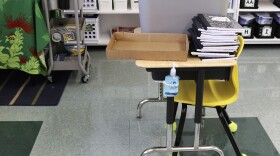A bill that would fund a centralized food data system and train cafeteria staff at Hawaiʻi’s public schools has moved forward.
The state previously set a goal in Act 175 of 2021 that at least 30% of food served in public schools to be locally sourced by 2030.
As part of the law, the state Department of Education was to deliver an annual report. The report filed to the Legislature in December said the department needs funding to develop a system to collect food service data. Its current system is not automated and data are separated by individual schools.
On Wednesday, the House committees on Agriculture and Education heard House Bill 2304 – which would fund the system.
Micah Munekata, director of government affairs at Ulupono Initiative, testified in support of the bill. Munekata said establishing baseline numbers can help the state make strategic decisions and meet its goals.
He said there have been pilot programs in Kohala, Kauaʻi and Mililani over the past 10 years.
"Looking at some of the data that came out of those pilots was very telling," Munekata said at the hearing. "And what that really showed is that you're able to implement local food products into local meals, for the kids and for other institutions really, and still be able to save money."
Randall Tanaka, the assistant superintendent for DOE facilities, said the department is currently evaluating two software systems and should have a decision within three months.
He said the current system is not equipped to measure local food usage.
"I would describe this as a failure of effort. We have a system but our schools are not geared to this kind of measurement tools," Tanaka said. "The managers, their first directive is really to get the food and feed it to the kids. So the management skills, we need to plus up our staff. And in the last year, I had a person temporarily assigned into that division, that is not so much a food person, but a management person, because I believe the failure that we have is understanding systems and the process that we need to have to measure our success. And we have been poor at that."
Tanaka said the failure is in systems and continuous training.
"I've talked to a few of the cafeteria managers and the kitchen operations, and they want to continue to do the job," he said. "They have the same aspirations we do. We want the kids to go home and say, 'Mom, this is the best meal I've had in the school,' and we're getting there. But this management tool is going to help us advance to a place where I know what we're producing, at what costs and what volume, and who we're buying from."
HB 2304 was amended at the hearing and would appropriate $1.6 million to implement the software and train staff. An additional $350,000 would be appropriated every year to pay for annual software costs.
The bill passed the joint committee and awaits a hearing with the Finance Committee.




